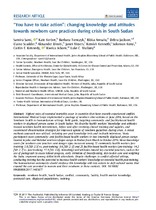“You have to take action”: changing knowledge and attitudes towards newborn care practices during crisis in South Sudan

View/
Date
2017Author
Sami, Samira
Kerber, Kate
Tomczyk, Barbara
Amsalu, Ribka
Jackson, Debra
Metadata
Show full item recordAbstract
Highest rates of neonatal mortality occur in countries that have recently experienced conflict.
International Medical Corps implemented a package of newborn interventions in June 2016, based on the
Newborn health in humanitarian settings: field guide, targeting community- and facility-based health
workers in displaced person camps in South Sudan. We describe health workers’ knowledge and attitudes
toward newborn health interventions, before and after receiving clinical training and supplies, and
recommend dissemination strategies for improved uptake of newborn guidelines during crises. A mixed
methods approach was utilised, including pre–post knowledge tests and in-depth interviews. Study
participants were community- and facility-based health workers in two internally displaced person camps
located in Juba and Malakal and two refugee camps in Maban from March to October 2016. Mean knowledge
scores for newborn care practices and danger signs increased among 72 community health workers (pretraining:
5.8 [SD: 2.3] vs. post-training: 9.6 [SD: 2.1]) and 25 facility-based health workers (pre-training: 14.2
[SD: 2.7] vs. post-training: 17.4 [SD: 2.8]). Knowledge and attitudes toward key essential practices, such as the
use of partograph to assess labour progress, early initiation of breastfeeding, skin-to-skin care and weighing
the baby, improved among skilled birth attendants. Despite challenges in conflict-affected settings,
conducting training has the potential to increase health workers’ knowledge on neonatal health post-training.
The humanitarian community should reinforce this knowledge with key actions to shift cultural norms that
expand the care provided to women and their newborns in these contexts.
